A Research Proposal on Cultural Tourism Development in North Macedonia
VerifiedAdded on 2023/07/21
|10
|2856
|436
Report
AI Summary
This research proposal investigates the factors influencing the development of cultural tourism in the Republic of North Macedonia, with a focus on the North-Eastern region. It highlights the increasing demand for diverse and high-quality tourism experiences, emphasizing the potential of cultural tourism to replace mass coastal tourism. The study aims to identify and differentiate cultural-tourist potentials to enhance the country's competitiveness in the global tourism market. It addresses the importance of leveraging cultural heritage, the impact of social networks, and the role of cultural events in shaping a positive image of tourist destinations. The research seeks to provide insights for tourism workers to design effective strategies for developing the tourism sector and promoting North Macedonia as an attractive tourist destination, utilizing both traditional cultural assets and modern promotional tools.
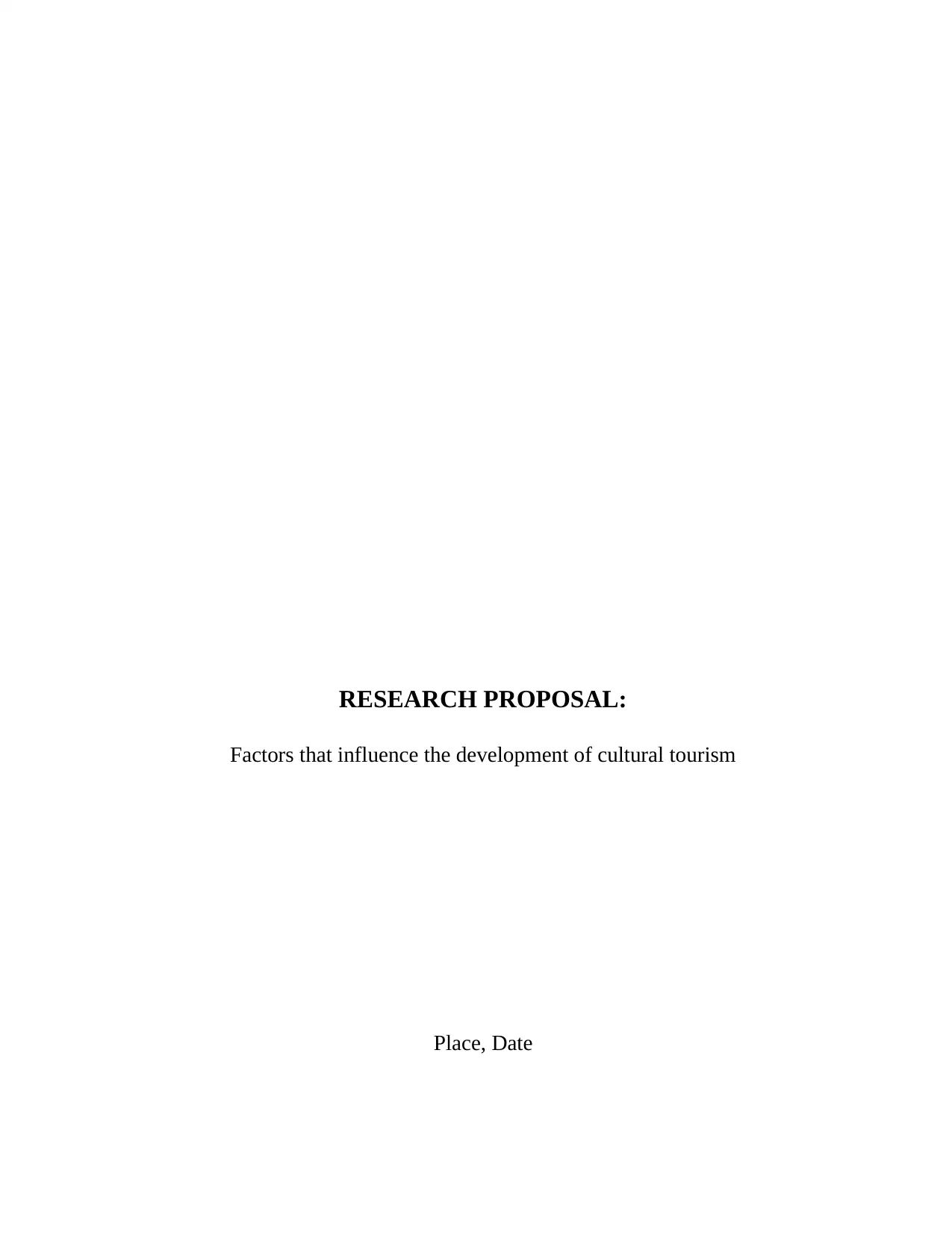
RESEARCH PROPOSAL:
Factors that influence the development of cultural tourism
Place, Date
Factors that influence the development of cultural tourism
Place, Date
Paraphrase This Document
Need a fresh take? Get an instant paraphrase of this document with our AI Paraphraser
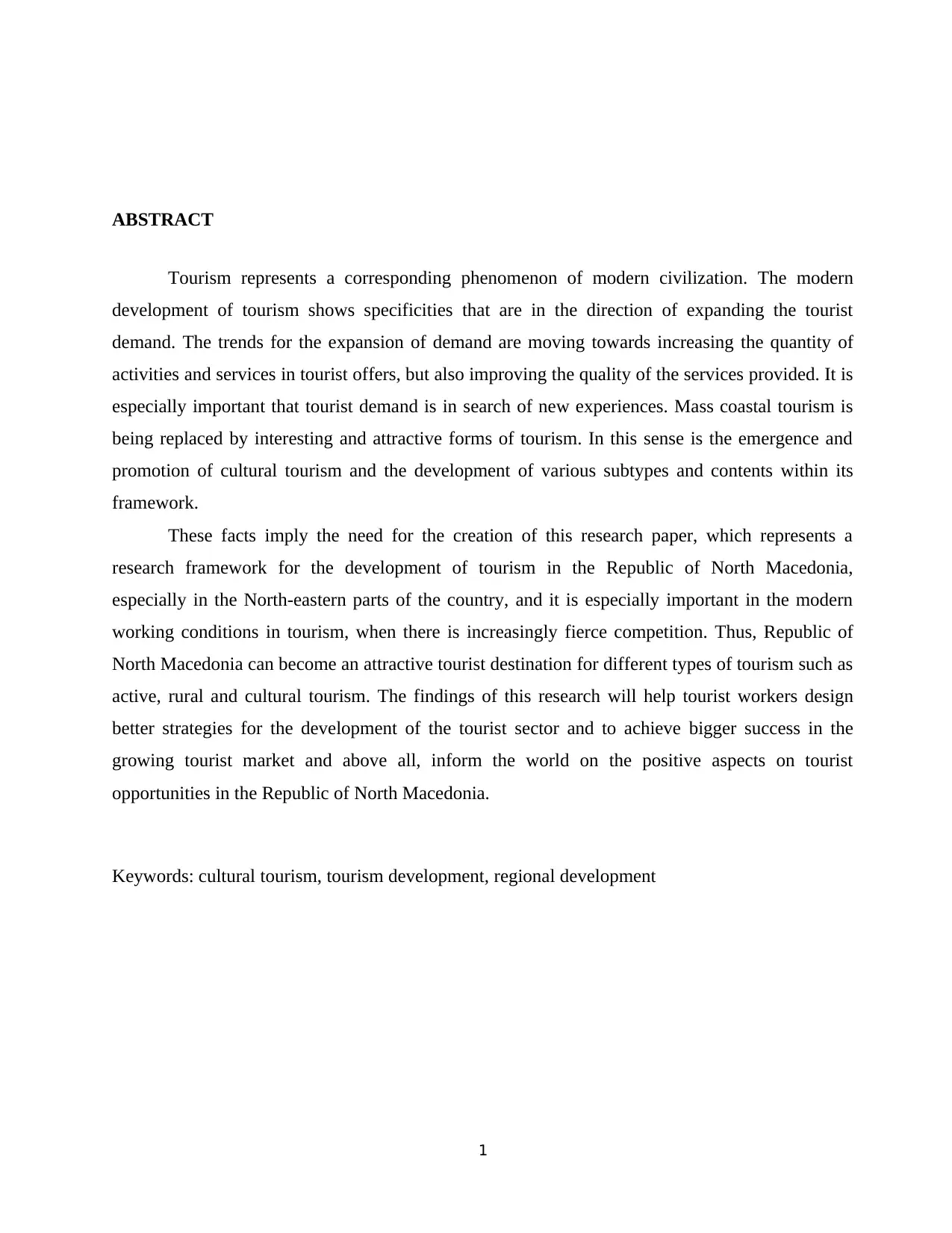
ABSTRACT
Tourism represents a corresponding phenomenon of modern civilization. The modern
development of tourism shows specificities that are in the direction of expanding the tourist
demand. The trends for the expansion of demand are moving towards increasing the quantity of
activities and services in tourist offers, but also improving the quality of the services provided. It is
especially important that tourist demand is in search of new experiences. Mass coastal tourism is
being replaced by interesting and attractive forms of tourism. In this sense is the emergence and
promotion of cultural tourism and the development of various subtypes and contents within its
framework.
These facts imply the need for the creation of this research paper, which represents a
research framework for the development of tourism in the Republic of North Macedonia,
especially in the North-eastern parts of the country, and it is especially important in the modern
working conditions in tourism, when there is increasingly fierce competition. Thus, Republic of
North Macedonia can become an attractive tourist destination for different types of tourism such as
active, rural and cultural tourism. The findings of this research will help tourist workers design
better strategies for the development of the tourist sector and to achieve bigger success in the
growing tourist market and above all, inform the world on the positive aspects on tourist
opportunities in the Republic of North Macedonia.
Keywords: cultural tourism, tourism development, regional development
1
Tourism represents a corresponding phenomenon of modern civilization. The modern
development of tourism shows specificities that are in the direction of expanding the tourist
demand. The trends for the expansion of demand are moving towards increasing the quantity of
activities and services in tourist offers, but also improving the quality of the services provided. It is
especially important that tourist demand is in search of new experiences. Mass coastal tourism is
being replaced by interesting and attractive forms of tourism. In this sense is the emergence and
promotion of cultural tourism and the development of various subtypes and contents within its
framework.
These facts imply the need for the creation of this research paper, which represents a
research framework for the development of tourism in the Republic of North Macedonia,
especially in the North-eastern parts of the country, and it is especially important in the modern
working conditions in tourism, when there is increasingly fierce competition. Thus, Republic of
North Macedonia can become an attractive tourist destination for different types of tourism such as
active, rural and cultural tourism. The findings of this research will help tourist workers design
better strategies for the development of the tourist sector and to achieve bigger success in the
growing tourist market and above all, inform the world on the positive aspects on tourist
opportunities in the Republic of North Macedonia.
Keywords: cultural tourism, tourism development, regional development
1
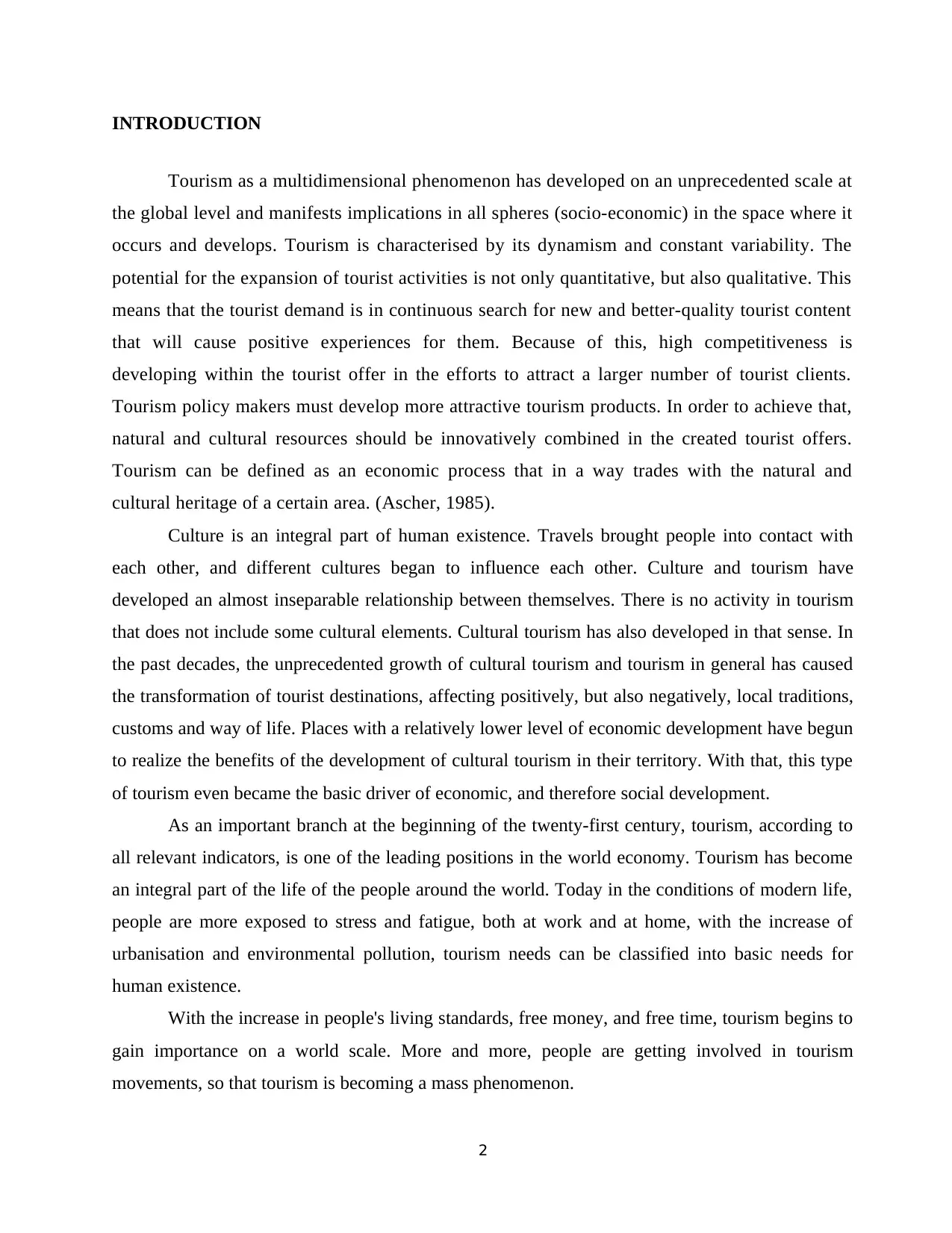
INTRODUCTION
Tourism as a multidimensional phenomenon has developed on an unprecedented scale at
the global level and manifests implications in all spheres (socio-economic) in the space where it
occurs and develops. Tourism is characterised by its dynamism and constant variability. The
potential for the expansion of tourist activities is not only quantitative, but also qualitative. This
means that the tourist demand is in continuous search for new and better-quality tourist content
that will cause positive experiences for them. Because of this, high competitiveness is
developing within the tourist offer in the efforts to attract a larger number of tourist clients.
Tourism policy makers must develop more attractive tourism products. In order to achieve that,
natural and cultural resources should be innovatively combined in the created tourist offers.
Tourism can be defined as an economic process that in a way trades with the natural and
cultural heritage of a certain area. (Ascher, 1985).
Culture is an integral part of human existence. Travels brought people into contact with
each other, and different cultures began to influence each other. Culture and tourism have
developed an almost inseparable relationship between themselves. There is no activity in tourism
that does not include some cultural elements. Cultural tourism has also developed in that sense. In
the past decades, the unprecedented growth of cultural tourism and tourism in general has caused
the transformation of tourist destinations, affecting positively, but also negatively, local traditions,
customs and way of life. Places with a relatively lower level of economic development have begun
to realize the benefits of the development of cultural tourism in their territory. With that, this type
of tourism even became the basic driver of economic, and therefore social development.
As an important branch at the beginning of the twenty-first century, tourism, according to
all relevant indicators, is one of the leading positions in the world economy. Tourism has become
an integral part of the life of the people around the world. Today in the conditions of modern life,
people are more exposed to stress and fatigue, both at work and at home, with the increase of
urbanisation and environmental pollution, tourism needs can be classified into basic needs for
human existence.
With the increase in people's living standards, free money, and free time, tourism begins to
gain importance on a world scale. More and more, people are getting involved in tourism
movements, so that tourism is becoming a mass phenomenon.
2
Tourism as a multidimensional phenomenon has developed on an unprecedented scale at
the global level and manifests implications in all spheres (socio-economic) in the space where it
occurs and develops. Tourism is characterised by its dynamism and constant variability. The
potential for the expansion of tourist activities is not only quantitative, but also qualitative. This
means that the tourist demand is in continuous search for new and better-quality tourist content
that will cause positive experiences for them. Because of this, high competitiveness is
developing within the tourist offer in the efforts to attract a larger number of tourist clients.
Tourism policy makers must develop more attractive tourism products. In order to achieve that,
natural and cultural resources should be innovatively combined in the created tourist offers.
Tourism can be defined as an economic process that in a way trades with the natural and
cultural heritage of a certain area. (Ascher, 1985).
Culture is an integral part of human existence. Travels brought people into contact with
each other, and different cultures began to influence each other. Culture and tourism have
developed an almost inseparable relationship between themselves. There is no activity in tourism
that does not include some cultural elements. Cultural tourism has also developed in that sense. In
the past decades, the unprecedented growth of cultural tourism and tourism in general has caused
the transformation of tourist destinations, affecting positively, but also negatively, local traditions,
customs and way of life. Places with a relatively lower level of economic development have begun
to realize the benefits of the development of cultural tourism in their territory. With that, this type
of tourism even became the basic driver of economic, and therefore social development.
As an important branch at the beginning of the twenty-first century, tourism, according to
all relevant indicators, is one of the leading positions in the world economy. Tourism has become
an integral part of the life of the people around the world. Today in the conditions of modern life,
people are more exposed to stress and fatigue, both at work and at home, with the increase of
urbanisation and environmental pollution, tourism needs can be classified into basic needs for
human existence.
With the increase in people's living standards, free money, and free time, tourism begins to
gain importance on a world scale. More and more, people are getting involved in tourism
movements, so that tourism is becoming a mass phenomenon.
2
⊘ This is a preview!⊘
Do you want full access?
Subscribe today to unlock all pages.

Trusted by 1+ million students worldwide
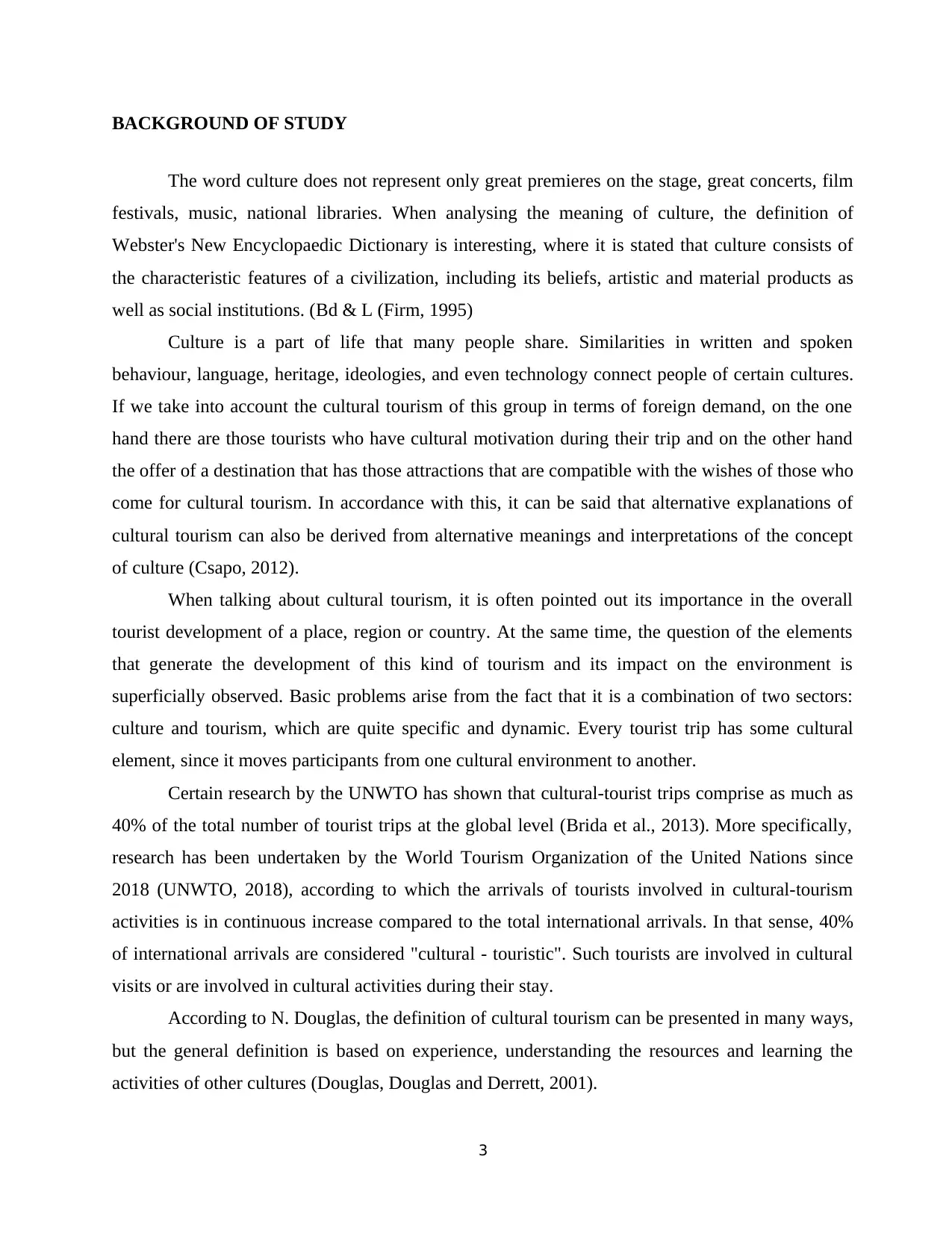
BACKGROUND OF STUDY
The word culture does not represent only great premieres on the stage, great concerts, film
festivals, music, national libraries. When analysing the meaning of culture, the definition of
Webster's New Encyclopaedic Dictionary is interesting, where it is stated that culture consists of
the characteristic features of a civilization, including its beliefs, artistic and material products as
well as social institutions. (Bd & L (Firm, 1995)
Culture is a part of life that many people share. Similarities in written and spoken
behaviour, language, heritage, ideologies, and even technology connect people of certain cultures.
If we take into account the cultural tourism of this group in terms of foreign demand, on the one
hand there are those tourists who have cultural motivation during their trip and on the other hand
the offer of a destination that has those attractions that are compatible with the wishes of those who
come for cultural tourism. In accordance with this, it can be said that alternative explanations of
cultural tourism can also be derived from alternative meanings and interpretations of the concept
of culture (Csapo, 2012).
When talking about cultural tourism, it is often pointed out its importance in the overall
tourist development of a place, region or country. At the same time, the question of the elements
that generate the development of this kind of tourism and its impact on the environment is
superficially observed. Basic problems arise from the fact that it is a combination of two sectors:
culture and tourism, which are quite specific and dynamic. Every tourist trip has some cultural
element, since it moves participants from one cultural environment to another.
Certain research by the UNWTO has shown that cultural-tourist trips comprise as much as
40% of the total number of tourist trips at the global level (Brida et al., 2013). More specifically,
research has been undertaken by the World Tourism Organization of the United Nations since
2018 (UNWTO, 2018), according to which the arrivals of tourists involved in cultural-tourism
activities is in continuous increase compared to the total international arrivals. In that sense, 40%
of international arrivals are considered "cultural - touristic". Such tourists are involved in cultural
visits or are involved in cultural activities during their stay.
According to N. Douglas, the definition of cultural tourism can be presented in many ways,
but the general definition is based on experience, understanding the resources and learning the
activities of other cultures (Douglas, Douglas and Derrett, 2001).
3
The word culture does not represent only great premieres on the stage, great concerts, film
festivals, music, national libraries. When analysing the meaning of culture, the definition of
Webster's New Encyclopaedic Dictionary is interesting, where it is stated that culture consists of
the characteristic features of a civilization, including its beliefs, artistic and material products as
well as social institutions. (Bd & L (Firm, 1995)
Culture is a part of life that many people share. Similarities in written and spoken
behaviour, language, heritage, ideologies, and even technology connect people of certain cultures.
If we take into account the cultural tourism of this group in terms of foreign demand, on the one
hand there are those tourists who have cultural motivation during their trip and on the other hand
the offer of a destination that has those attractions that are compatible with the wishes of those who
come for cultural tourism. In accordance with this, it can be said that alternative explanations of
cultural tourism can also be derived from alternative meanings and interpretations of the concept
of culture (Csapo, 2012).
When talking about cultural tourism, it is often pointed out its importance in the overall
tourist development of a place, region or country. At the same time, the question of the elements
that generate the development of this kind of tourism and its impact on the environment is
superficially observed. Basic problems arise from the fact that it is a combination of two sectors:
culture and tourism, which are quite specific and dynamic. Every tourist trip has some cultural
element, since it moves participants from one cultural environment to another.
Certain research by the UNWTO has shown that cultural-tourist trips comprise as much as
40% of the total number of tourist trips at the global level (Brida et al., 2013). More specifically,
research has been undertaken by the World Tourism Organization of the United Nations since
2018 (UNWTO, 2018), according to which the arrivals of tourists involved in cultural-tourism
activities is in continuous increase compared to the total international arrivals. In that sense, 40%
of international arrivals are considered "cultural - touristic". Such tourists are involved in cultural
visits or are involved in cultural activities during their stay.
According to N. Douglas, the definition of cultural tourism can be presented in many ways,
but the general definition is based on experience, understanding the resources and learning the
activities of other cultures (Douglas, Douglas and Derrett, 2001).
3
Paraphrase This Document
Need a fresh take? Get an instant paraphrase of this document with our AI Paraphraser
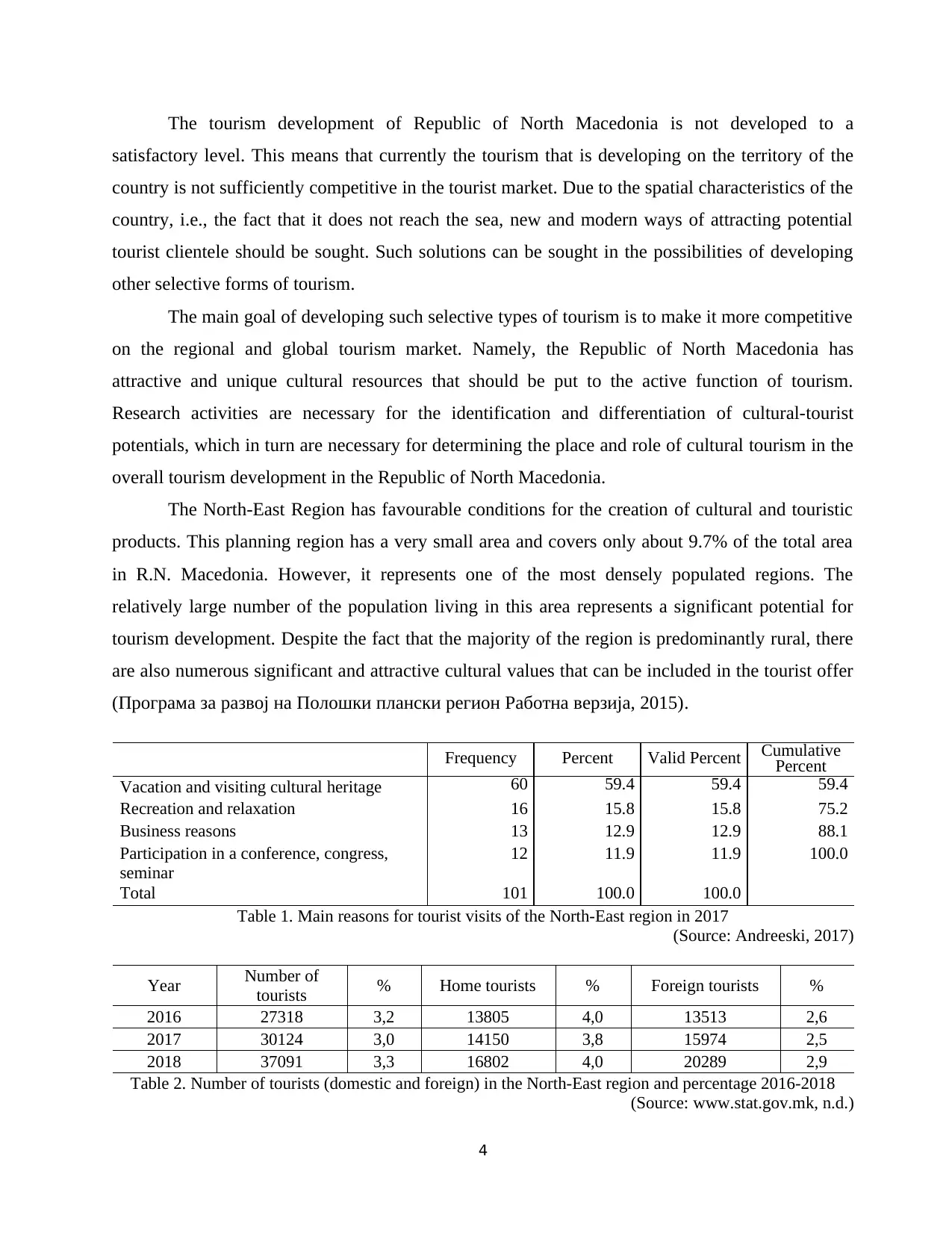
The tourism development of Republic of North Macedonia is not developed to a
satisfactory level. This means that currently the tourism that is developing on the territory of the
country is not sufficiently competitive in the tourist market. Due to the spatial characteristics of the
country, i.e., the fact that it does not reach the sea, new and modern ways of attracting potential
tourist clientele should be sought. Such solutions can be sought in the possibilities of developing
other selective forms of tourism.
The main goal of developing such selective types of tourism is to make it more competitive
on the regional and global tourism market. Namely, the Republic of North Macedonia has
attractive and unique cultural resources that should be put to the active function of tourism.
Research activities are necessary for the identification and differentiation of cultural-tourist
potentials, which in turn are necessary for determining the place and role of cultural tourism in the
overall tourism development in the Republic of North Macedonia.
The North-East Region has favourable conditions for the creation of cultural and touristic
products. This planning region has a very small area and covers only about 9.7% of the total area
in R.N. Macedonia. However, it represents one of the most densely populated regions. The
relatively large number of the population living in this area represents a significant potential for
tourism development. Despite the fact that the majority of the region is predominantly rural, there
are also numerous significant and attractive cultural values that can be included in the tourist offer
(Програма за развој на Полошки плански регион Работна верзија, 2015).
Frequency Percent Valid Percent Cumulative
Percent
Vacation and visiting cultural heritage 60 59.4 59.4 59.4
Recreation and relaxation 16 15.8 15.8 75.2
Business reasons 13 12.9 12.9 88.1
Participation in a conference, congress,
seminar
12 11.9 11.9 100.0
Total 101 100.0 100.0
Table 1. Main reasons for tourist visits of the North-East region in 2017
(Source: Andreeski, 2017)
Year Number of
tourists % Home tourists % Foreign tourists %
2016 27318 3,2 13805 4,0 13513 2,6
2017 30124 3,0 14150 3,8 15974 2,5
2018 37091 3,3 16802 4,0 20289 2,9
Table 2. Number of tourists (domestic and foreign) in the North-East region and percentage 2016-2018
(Source: www.stat.gov.mk, n.d.)
4
satisfactory level. This means that currently the tourism that is developing on the territory of the
country is not sufficiently competitive in the tourist market. Due to the spatial characteristics of the
country, i.e., the fact that it does not reach the sea, new and modern ways of attracting potential
tourist clientele should be sought. Such solutions can be sought in the possibilities of developing
other selective forms of tourism.
The main goal of developing such selective types of tourism is to make it more competitive
on the regional and global tourism market. Namely, the Republic of North Macedonia has
attractive and unique cultural resources that should be put to the active function of tourism.
Research activities are necessary for the identification and differentiation of cultural-tourist
potentials, which in turn are necessary for determining the place and role of cultural tourism in the
overall tourism development in the Republic of North Macedonia.
The North-East Region has favourable conditions for the creation of cultural and touristic
products. This planning region has a very small area and covers only about 9.7% of the total area
in R.N. Macedonia. However, it represents one of the most densely populated regions. The
relatively large number of the population living in this area represents a significant potential for
tourism development. Despite the fact that the majority of the region is predominantly rural, there
are also numerous significant and attractive cultural values that can be included in the tourist offer
(Програма за развој на Полошки плански регион Работна верзија, 2015).
Frequency Percent Valid Percent Cumulative
Percent
Vacation and visiting cultural heritage 60 59.4 59.4 59.4
Recreation and relaxation 16 15.8 15.8 75.2
Business reasons 13 12.9 12.9 88.1
Participation in a conference, congress,
seminar
12 11.9 11.9 100.0
Total 101 100.0 100.0
Table 1. Main reasons for tourist visits of the North-East region in 2017
(Source: Andreeski, 2017)
Year Number of
tourists % Home tourists % Foreign tourists %
2016 27318 3,2 13805 4,0 13513 2,6
2017 30124 3,0 14150 3,8 15974 2,5
2018 37091 3,3 16802 4,0 20289 2,9
Table 2. Number of tourists (domestic and foreign) in the North-East region and percentage 2016-2018
(Source: www.stat.gov.mk, n.d.)
4
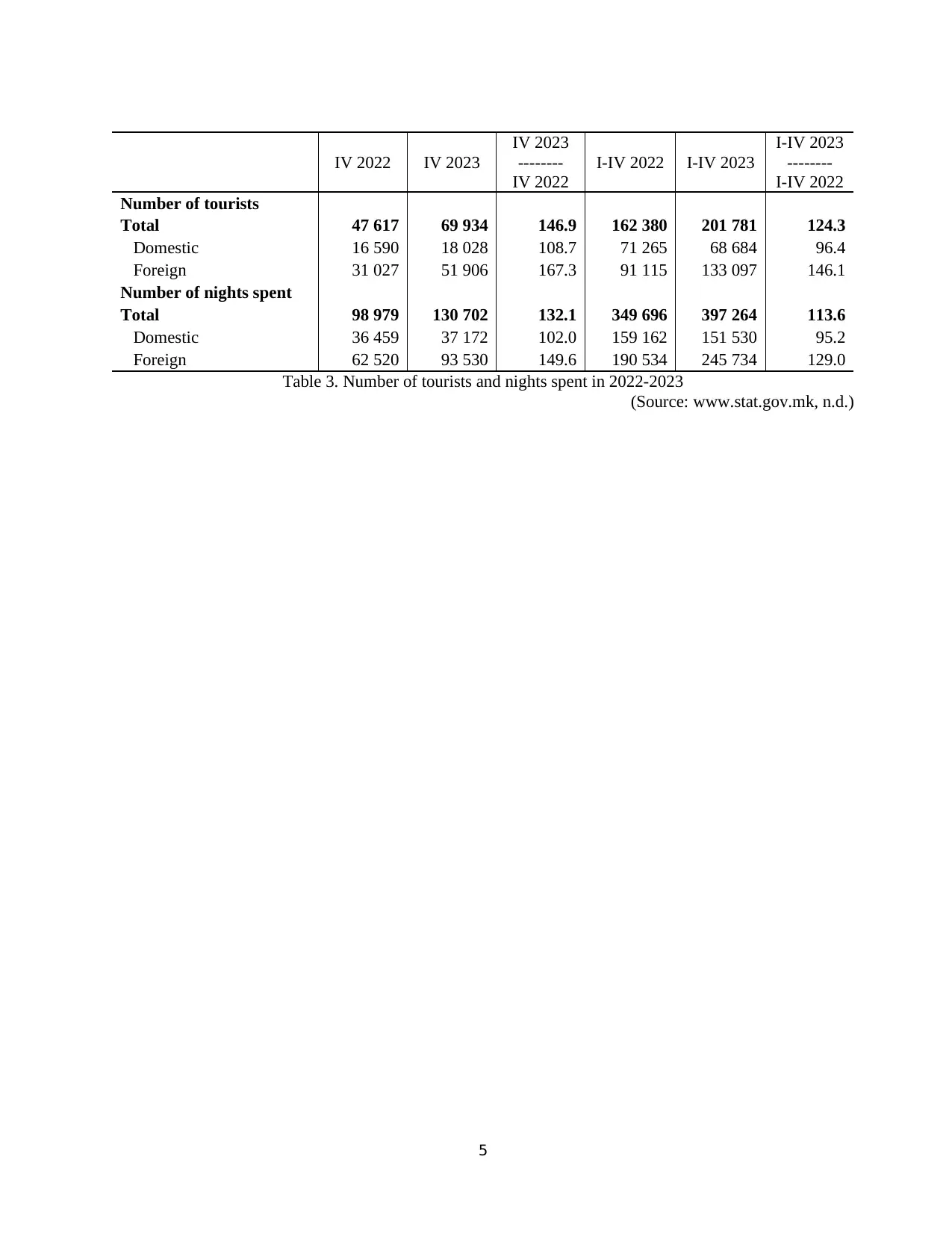
IV 2022 IV 2023
IV 2023
--------
IV 2022
I-IV 2022 I-IV 2023
I-IV 2023
--------
I-IV 2022
Number of tourists
Total 47 617 69 934 146.9 162 380 201 781 124.3
Domestic 16 590 18 028 108.7 71 265 68 684 96.4
Foreign 31 027 51 906 167.3 91 115 133 097 146.1
Number of nights spent
Total 98 979 130 702 132.1 349 696 397 264 113.6
Domestic 36 459 37 172 102.0 159 162 151 530 95.2
Foreign 62 520 93 530 149.6 190 534 245 734 129.0
Table 3. Number of tourists and nights spent in 2022-2023
(Source: www.stat.gov.mk, n.d.)
5
IV 2023
--------
IV 2022
I-IV 2022 I-IV 2023
I-IV 2023
--------
I-IV 2022
Number of tourists
Total 47 617 69 934 146.9 162 380 201 781 124.3
Domestic 16 590 18 028 108.7 71 265 68 684 96.4
Foreign 31 027 51 906 167.3 91 115 133 097 146.1
Number of nights spent
Total 98 979 130 702 132.1 349 696 397 264 113.6
Domestic 36 459 37 172 102.0 159 162 151 530 95.2
Foreign 62 520 93 530 149.6 190 534 245 734 129.0
Table 3. Number of tourists and nights spent in 2022-2023
(Source: www.stat.gov.mk, n.d.)
5
⊘ This is a preview!⊘
Do you want full access?
Subscribe today to unlock all pages.

Trusted by 1+ million students worldwide
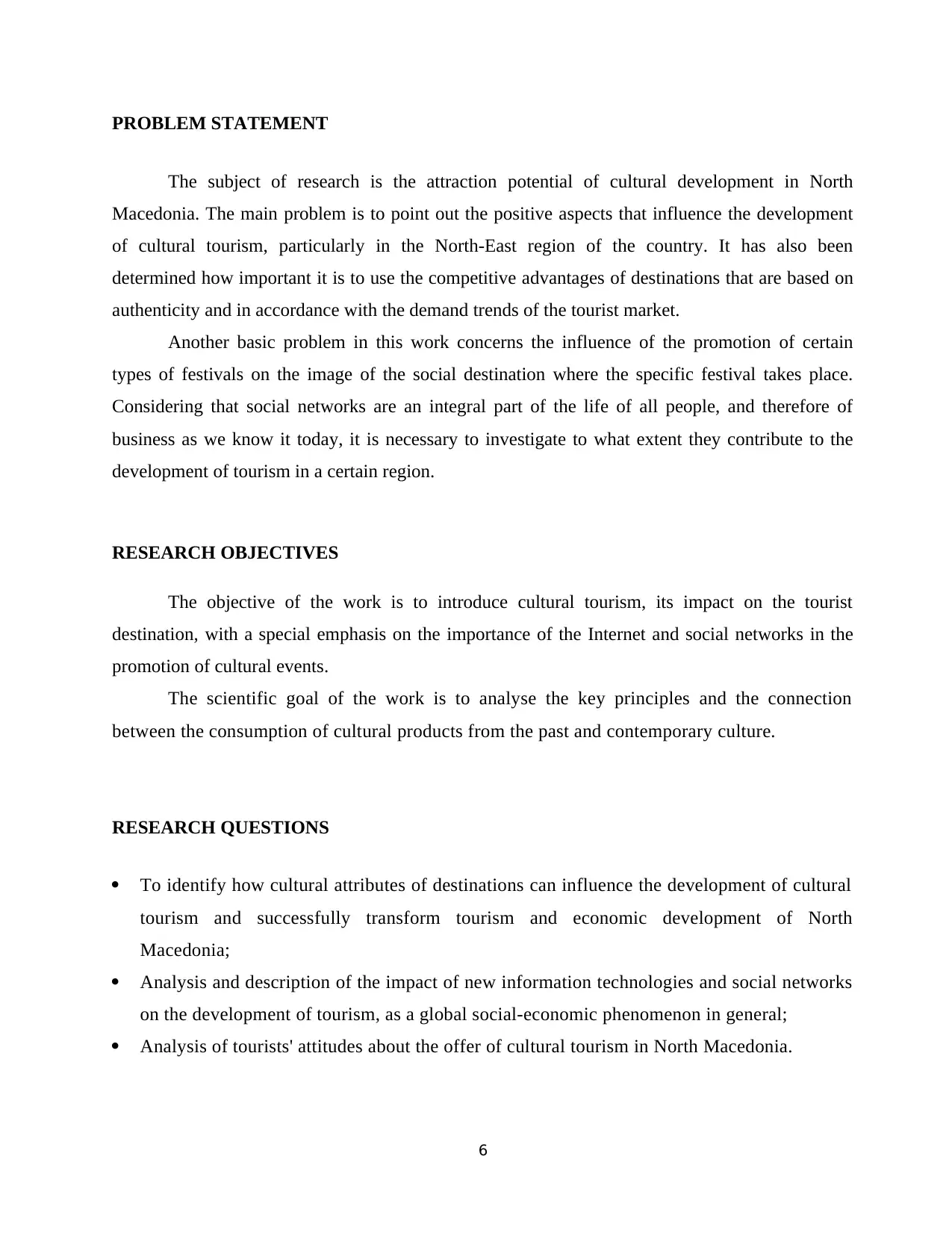
PROBLEM STATEMENT
The subject of research is the attraction potential of cultural development in North
Macedonia. The main problem is to point out the positive aspects that influence the development
of cultural tourism, particularly in the North-East region of the country. It has also been
determined how important it is to use the competitive advantages of destinations that are based on
authenticity and in accordance with the demand trends of the tourist market.
Another basic problem in this work concerns the influence of the promotion of certain
types of festivals on the image of the social destination where the specific festival takes place.
Considering that social networks are an integral part of the life of all people, and therefore of
business as we know it today, it is necessary to investigate to what extent they contribute to the
development of tourism in a certain region.
RESEARCH OBJECTIVES
The objective of the work is to introduce cultural tourism, its impact on the tourist
destination, with a special emphasis on the importance of the Internet and social networks in the
promotion of cultural events.
The scientific goal of the work is to analyse the key principles and the connection
between the consumption of cultural products from the past and contemporary culture.
RESEARCH QUESTIONS
To identify how cultural attributes of destinations can influence the development of cultural
tourism and successfully transform tourism and economic development of North
Macedonia;
Analysis and description of the impact of new information technologies and social networks
on the development of tourism, as a global social-economic phenomenon in general;
Analysis of tourists' attitudes about the offer of cultural tourism in North Macedonia.
6
The subject of research is the attraction potential of cultural development in North
Macedonia. The main problem is to point out the positive aspects that influence the development
of cultural tourism, particularly in the North-East region of the country. It has also been
determined how important it is to use the competitive advantages of destinations that are based on
authenticity and in accordance with the demand trends of the tourist market.
Another basic problem in this work concerns the influence of the promotion of certain
types of festivals on the image of the social destination where the specific festival takes place.
Considering that social networks are an integral part of the life of all people, and therefore of
business as we know it today, it is necessary to investigate to what extent they contribute to the
development of tourism in a certain region.
RESEARCH OBJECTIVES
The objective of the work is to introduce cultural tourism, its impact on the tourist
destination, with a special emphasis on the importance of the Internet and social networks in the
promotion of cultural events.
The scientific goal of the work is to analyse the key principles and the connection
between the consumption of cultural products from the past and contemporary culture.
RESEARCH QUESTIONS
To identify how cultural attributes of destinations can influence the development of cultural
tourism and successfully transform tourism and economic development of North
Macedonia;
Analysis and description of the impact of new information technologies and social networks
on the development of tourism, as a global social-economic phenomenon in general;
Analysis of tourists' attitudes about the offer of cultural tourism in North Macedonia.
6
Paraphrase This Document
Need a fresh take? Get an instant paraphrase of this document with our AI Paraphraser
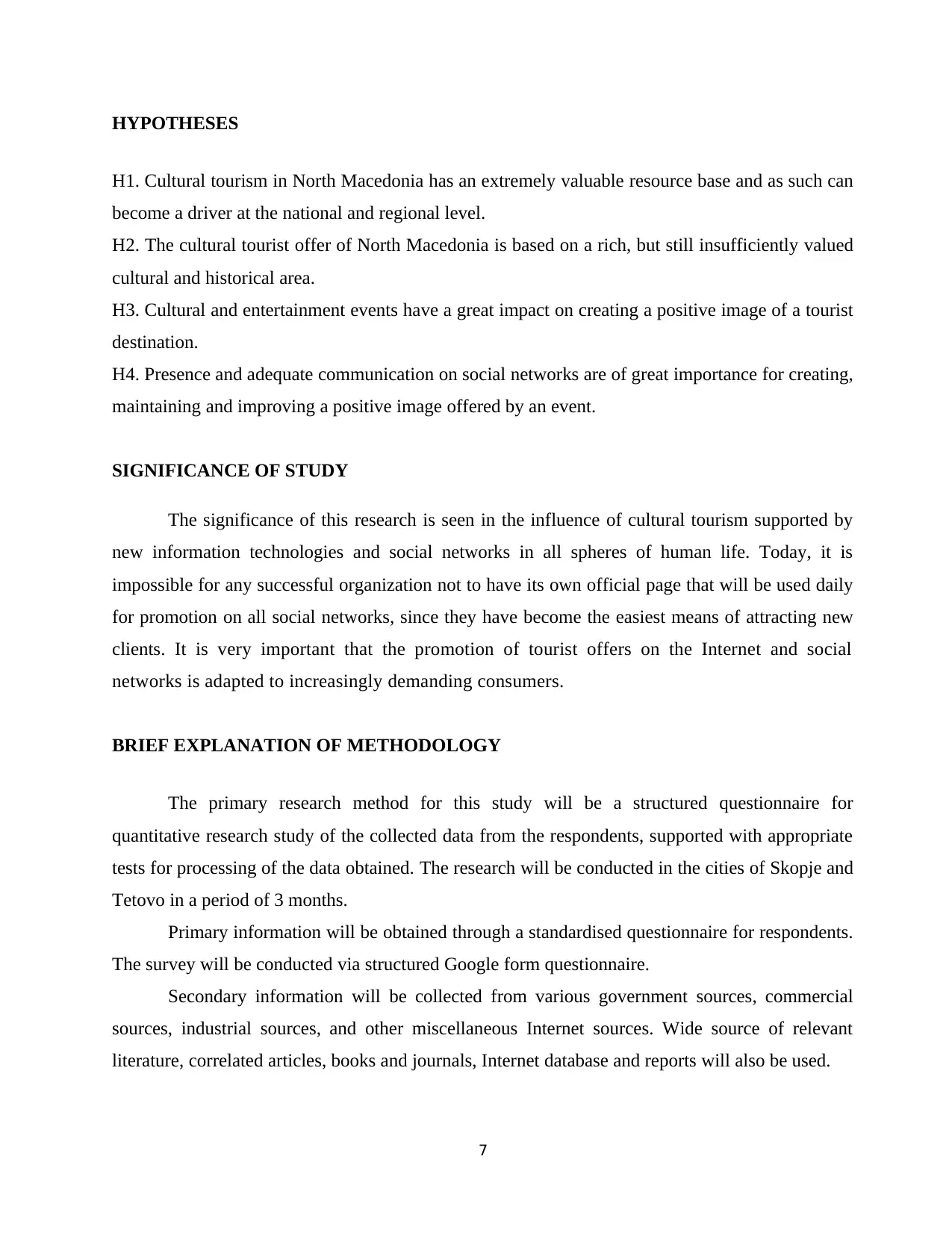
HYPOTHESES
H1. Cultural tourism in North Macedonia has an extremely valuable resource base and as such can
become a driver at the national and regional level.
H2. The cultural tourist offer of North Macedonia is based on a rich, but still insufficiently valued
cultural and historical area.
H3. Cultural and entertainment events have a great impact on creating a positive image of a tourist
destination.
H4. Presence and adequate communication on social networks are of great importance for creating,
maintaining and improving a positive image offered by an event.
SIGNIFICANCE OF STUDY
The significance of this research is seen in the influence of cultural tourism supported by
new information technologies and social networks in all spheres of human life. Today, it is
impossible for any successful organization not to have its own official page that will be used daily
for promotion on all social networks, since they have become the easiest means of attracting new
clients. It is very important that the promotion of tourist offers on the Internet and social
networks is adapted to increasingly demanding consumers.
BRIEF EXPLANATION OF METHODOLOGY
The primary research method for this study will be a structured questionnaire for
quantitative research study of the collected data from the respondents, supported with appropriate
tests for processing of the data obtained. The research will be conducted in the cities of Skopje and
Tetovo in a period of 3 months.
Primary information will be obtained through a standardised questionnaire for respondents.
The survey will be conducted via structured Google form questionnaire.
Secondary information will be collected from various government sources, commercial
sources, industrial sources, and other miscellaneous Internet sources. Wide source of relevant
literature, correlated articles, books and journals, Internet database and reports will also be used.
7
H1. Cultural tourism in North Macedonia has an extremely valuable resource base and as such can
become a driver at the national and regional level.
H2. The cultural tourist offer of North Macedonia is based on a rich, but still insufficiently valued
cultural and historical area.
H3. Cultural and entertainment events have a great impact on creating a positive image of a tourist
destination.
H4. Presence and adequate communication on social networks are of great importance for creating,
maintaining and improving a positive image offered by an event.
SIGNIFICANCE OF STUDY
The significance of this research is seen in the influence of cultural tourism supported by
new information technologies and social networks in all spheres of human life. Today, it is
impossible for any successful organization not to have its own official page that will be used daily
for promotion on all social networks, since they have become the easiest means of attracting new
clients. It is very important that the promotion of tourist offers on the Internet and social
networks is adapted to increasingly demanding consumers.
BRIEF EXPLANATION OF METHODOLOGY
The primary research method for this study will be a structured questionnaire for
quantitative research study of the collected data from the respondents, supported with appropriate
tests for processing of the data obtained. The research will be conducted in the cities of Skopje and
Tetovo in a period of 3 months.
Primary information will be obtained through a standardised questionnaire for respondents.
The survey will be conducted via structured Google form questionnaire.
Secondary information will be collected from various government sources, commercial
sources, industrial sources, and other miscellaneous Internet sources. Wide source of relevant
literature, correlated articles, books and journals, Internet database and reports will also be used.
7
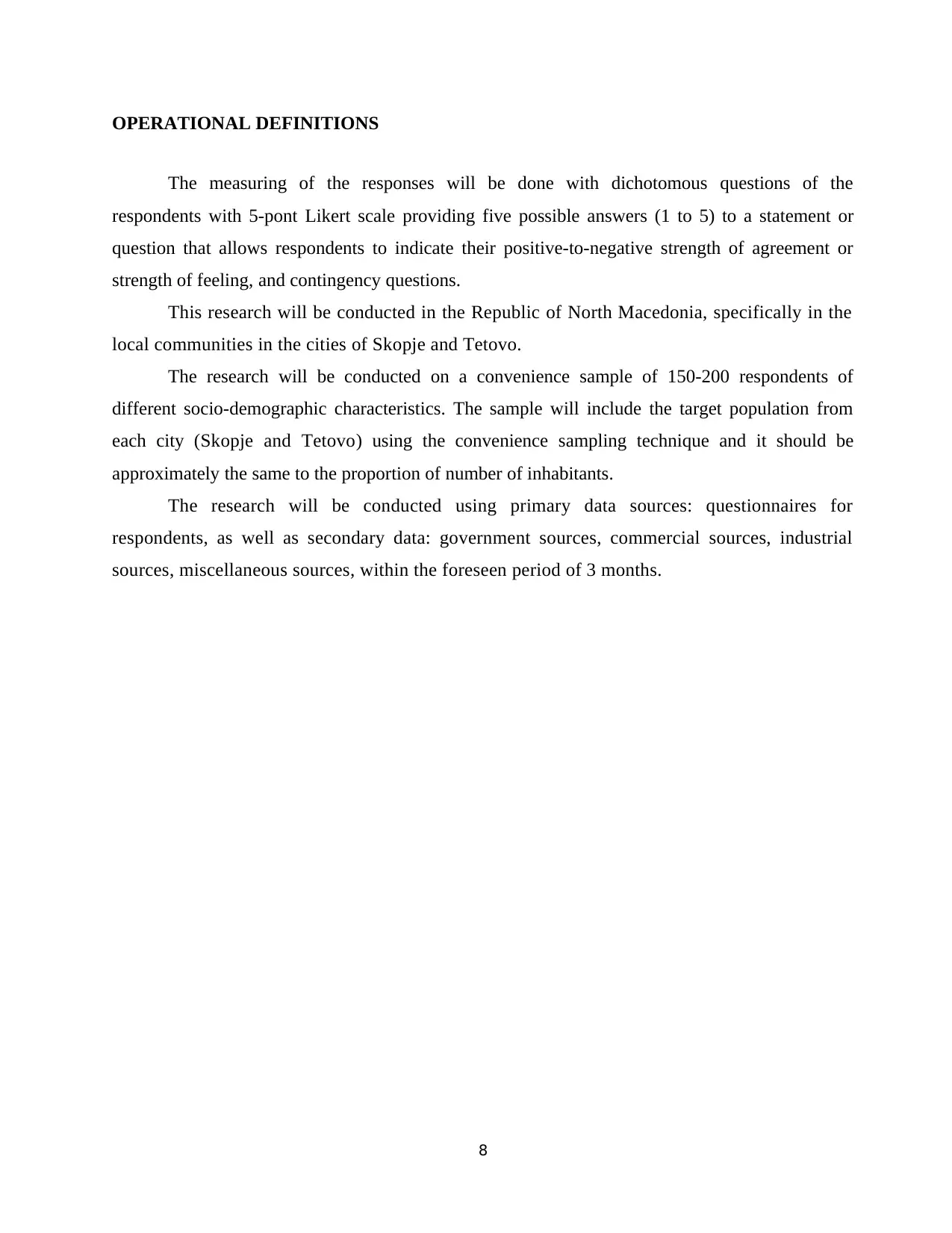
OPERATIONAL DEFINITIONS
The measuring of the responses will be done with dichotomous questions of the
respondents with 5-pont Likert scale providing five possible answers (1 to 5) to a statement or
question that allows respondents to indicate their positive-to-negative strength of agreement or
strength of feeling, and contingency questions.
This research will be conducted in the Republic of North Macedonia, specifically in the
local communities in the cities of Skopje and Tetovo.
The research will be conducted on a convenience sample of 150-200 respondents of
different socio-demographic characteristics. The sample will include the target population from
each city (Skopje and Tetovo) using the convenience sampling technique and it should be
approximately the same to the proportion of number of inhabitants.
The research will be conducted using primary data sources: questionnaires for
respondents, as well as secondary data: government sources, commercial sources, industrial
sources, miscellaneous sources, within the foreseen period of 3 months.
8
The measuring of the responses will be done with dichotomous questions of the
respondents with 5-pont Likert scale providing five possible answers (1 to 5) to a statement or
question that allows respondents to indicate their positive-to-negative strength of agreement or
strength of feeling, and contingency questions.
This research will be conducted in the Republic of North Macedonia, specifically in the
local communities in the cities of Skopje and Tetovo.
The research will be conducted on a convenience sample of 150-200 respondents of
different socio-demographic characteristics. The sample will include the target population from
each city (Skopje and Tetovo) using the convenience sampling technique and it should be
approximately the same to the proportion of number of inhabitants.
The research will be conducted using primary data sources: questionnaires for
respondents, as well as secondary data: government sources, commercial sources, industrial
sources, miscellaneous sources, within the foreseen period of 3 months.
8
⊘ This is a preview!⊘
Do you want full access?
Subscribe today to unlock all pages.

Trusted by 1+ million students worldwide
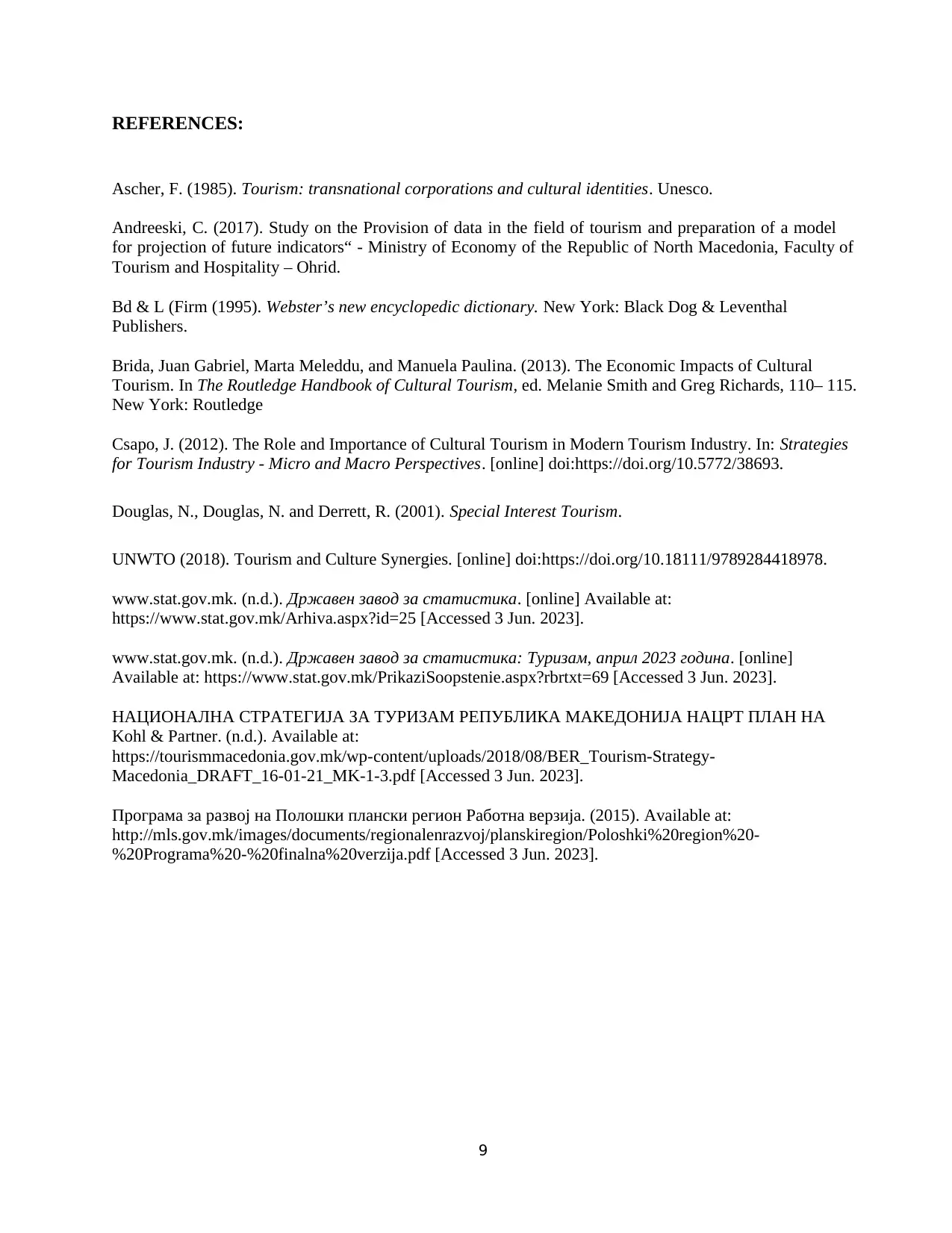
REFERENCES:
Ascher, F. (1985). Tourism: transnational corporations and cultural identities. Unesco.
Andreeski, C. (2017). Study on the Provision of data in the field of tourism and preparation of a model
for projection of future indicators“ - Ministry of Economy of the Republic of North Macedonia, Faculty of
Tourism and Hospitality – Ohrid.
Bd & L (Firm (1995). Webster’s new encyclopedic dictionary. New York: Black Dog & Leventhal
Publishers.
Brida, Juan Gabriel, Marta Meleddu, and Manuela Paulina. (2013). The Economic Impacts of Cultural
Tourism. In The Routledge Handbook of Cultural Tourism, ed. Melanie Smith and Greg Richards, 110– 115.
New York: Routledge
Csapo, J. (2012). The Role and Importance of Cultural Tourism in Modern Tourism Industry. In: Strategies
for Tourism Industry - Micro and Macro Perspectives. [online] doi:https://doi.org/10.5772/38693.
Douglas, N., Douglas, N. and Derrett, R. (2001). Special Interest Tourism.
UNWTO (2018). Tourism and Culture Synergies. [online] doi:https://doi.org/10.18111/9789284418978.
www.stat.gov.mk. (n.d.). Државен завод за статистика. [online] Available at:
https://www.stat.gov.mk/Arhiva.aspx?id=25 [Accessed 3 Jun. 2023].
www.stat.gov.mk. (n.d.). Државен завод за статистика: Туризам, април 2023 година. [online]
Available at: https://www.stat.gov.mk/PrikaziSoopstenie.aspx?rbrtxt=69 [Accessed 3 Jun. 2023].
НАЦИОНАЛНА СТРАТЕГИЈА ЗА ТУРИЗАМ РЕПУБЛИКА МАКЕДОНИЈА НАЦРТ ПЛАН НА
Kohl & Partner. (n.d.). Available at:
https://tourismmacedonia.gov.mk/wp-content/uploads/2018/08/BER_Tourism-Strategy-
Macedonia_DRAFT_16-01-21_MK-1-3.pdf [Accessed 3 Jun. 2023].
Програма за развој на Полошки плански регион Работна верзија. (2015). Available at:
http://mls.gov.mk/images/documents/regionalenrazvoj/planskiregion/Poloshki%20region%20-
%20Programa%20-%20finalna%20verzija.pdf [Accessed 3 Jun. 2023].
9
Ascher, F. (1985). Tourism: transnational corporations and cultural identities. Unesco.
Andreeski, C. (2017). Study on the Provision of data in the field of tourism and preparation of a model
for projection of future indicators“ - Ministry of Economy of the Republic of North Macedonia, Faculty of
Tourism and Hospitality – Ohrid.
Bd & L (Firm (1995). Webster’s new encyclopedic dictionary. New York: Black Dog & Leventhal
Publishers.
Brida, Juan Gabriel, Marta Meleddu, and Manuela Paulina. (2013). The Economic Impacts of Cultural
Tourism. In The Routledge Handbook of Cultural Tourism, ed. Melanie Smith and Greg Richards, 110– 115.
New York: Routledge
Csapo, J. (2012). The Role and Importance of Cultural Tourism in Modern Tourism Industry. In: Strategies
for Tourism Industry - Micro and Macro Perspectives. [online] doi:https://doi.org/10.5772/38693.
Douglas, N., Douglas, N. and Derrett, R. (2001). Special Interest Tourism.
UNWTO (2018). Tourism and Culture Synergies. [online] doi:https://doi.org/10.18111/9789284418978.
www.stat.gov.mk. (n.d.). Државен завод за статистика. [online] Available at:
https://www.stat.gov.mk/Arhiva.aspx?id=25 [Accessed 3 Jun. 2023].
www.stat.gov.mk. (n.d.). Државен завод за статистика: Туризам, април 2023 година. [online]
Available at: https://www.stat.gov.mk/PrikaziSoopstenie.aspx?rbrtxt=69 [Accessed 3 Jun. 2023].
НАЦИОНАЛНА СТРАТЕГИЈА ЗА ТУРИЗАМ РЕПУБЛИКА МАКЕДОНИЈА НАЦРТ ПЛАН НА
Kohl & Partner. (n.d.). Available at:
https://tourismmacedonia.gov.mk/wp-content/uploads/2018/08/BER_Tourism-Strategy-
Macedonia_DRAFT_16-01-21_MK-1-3.pdf [Accessed 3 Jun. 2023].
Програма за развој на Полошки плански регион Работна верзија. (2015). Available at:
http://mls.gov.mk/images/documents/regionalenrazvoj/planskiregion/Poloshki%20region%20-
%20Programa%20-%20finalna%20verzija.pdf [Accessed 3 Jun. 2023].
9
1 out of 10
Related Documents
Your All-in-One AI-Powered Toolkit for Academic Success.
+13062052269
info@desklib.com
Available 24*7 on WhatsApp / Email
![[object Object]](/_next/static/media/star-bottom.7253800d.svg)
Unlock your academic potential
Copyright © 2020–2025 A2Z Services. All Rights Reserved. Developed and managed by ZUCOL.


